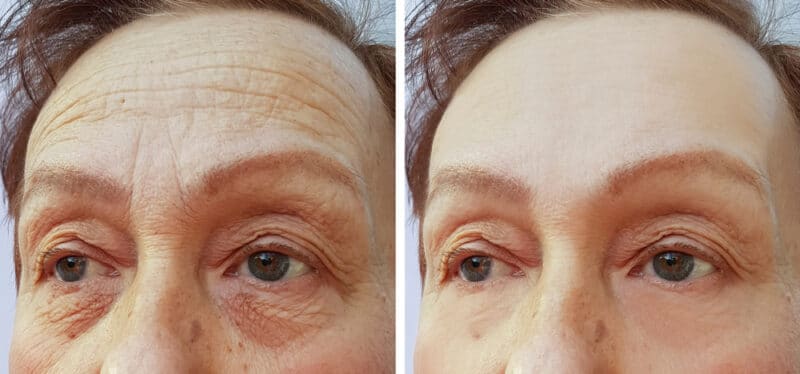Botox in Union City, NJ
Providing safe, affordable, and effective botox injections for patients in Union City, New Jersey
It’s an unfortunate fact that, even though there are a million and one different products out there designed to protect our skin and keep our complexions looking healthy and beautiful, time will inevitably begin taking its toll, leaving us with creases, furrows, crow’s feet, and frown lines that no lotion, cream, or serum can fully combat.
But while your skincare routine may be fighting a losing battle, there is one way to rejuvenate your complexion even after the wrinkles and creases are too significant to moisturize away: Botox.
An estimated 11 million people worldwide have used this simple treatment to temporarily reduce the appearance of lines and wrinkles on their faces and combat various medical problems such as excessive sweating and chronic migraines.
If you’re interested in learning more about the different ways in which Botox can potentially help you, visit Dr. Diana Rodriguez, DMD, at Union City Mini Dental Implants to learn more. Keep reading to learn more about Botox and what you can expect during a treatment procedure.
What Is Botox?
 Botox is the brand name for a product that contains a specific toxin created by the bacterium Clostridium botulinum. The toxin is injected into certain areas of the face, where it blocks signals between the nervous system and the muscles and temporarily reduces creases and wrinkles in the face.
Botox is the brand name for a product that contains a specific toxin created by the bacterium Clostridium botulinum. The toxin is injected into certain areas of the face, where it blocks signals between the nervous system and the muscles and temporarily reduces creases and wrinkles in the face.
This treatment has started to grow in popularity over the last ten to 20 years, but it has been in use since 1989.
However, the original FDA approval for Botox was not for cosmetic purposes; it was for the treatment of eye and muscle problems. Its application as a totally cosmetic procedure used to combat wrinkles received FDA approval in 2002.
Are Botox Injections Safe?
While the concept of Botox injections may sound potentially dangerous, they are widely regarded as a safe and effective treatment. However, you should make sure to receive your Botox treatments from a doctor with the necessary experience.
There are only a handful of reasons your doctor might recommend against Botox, including if you’re pregnant or nursing or have an allergy to cow’s milk protein.
However, it’s important to know that this treatment is not without its risks. There are a few potential side effects that you may experience, including:
- Swelling, bruising, or pain at the injection site
- Drooping eyelids or uneven eyebrows
- Flu-like symptoms or headache
- Crooked smile
- Drooling
- Dry eyes
- Excessive tearing
- Double vision
- Allergic reactions
These side effects are largely avoidable provided the injections are placed accurately, which is why you want to make sure you receive the treatment from a qualified and experienced professional.

What Else Does Botox Treat?
It may be renowned for its ability to reduce the appearance of creasing and wrinkles in the face, but there are a number of other things that Botox can treat. A few of the most common have been listed below, along with some details about each.
Migraines
Sufferers of frequent migraines are generally looking for any solution they can find, and Botox is a surprisingly effective one. Interestingly enough, experts don’t really understand why Botox injections can help treat migraines, but it’s believed to be connected with the treatment’s ability to block pain signals and relax muscles.
Acne
While Botox may not be able to totally eliminate acne, it can reduce the amount of oil your face produces, which can reduce breakouts and help you achieve a clearer complexion. This treatment requires that your doctor use only a tiny amount of Botox, as using too much will result in an inability to use your facial muscles at all.
Hyperhidrosis
Hyperhidrosis is a condition characterized by excessive sweating. This issue can be difficult to live with for many reasons, and there are very few effective ways to treat it outside of Botox.
In the same way that the treatment blocks signals between facial muscles and the nervous system, it can block signals from sweat glands, reducing excess perspiration.
Overactive Bladder
Another condition that’s not only uncomfortable but potentially quite embarrassing is an overactive bladder. This inconvenient problem can really do a number on your quality of life. There aren’t too many ways to treat this condition, but Botox is one of them, and it has been found to be highly effective in some cases.
The Botox Procedure
If you decide that Botox may be a good solution for you, you’ll need to confirm it with your doctor. If it’s determined that you’d be a good candidate for the treatment, then you can expect the following:
Preparing for the Procedure
There isn’t all that much that you need to do to prepare for your Botox injections, but there are a few things you’ll want to avoid.
Those things include drinking alcohol the week before your appointment, taking anti-inflammatories or blood thinners, eating any garlic the week before (it may increase bruising), and wearing makeup to your appointment.
At Your Appointment
You don’t have to worry about much pain or discomfort during the procedure, but if you are concerned about it, you can have the injection sites numbed using a topical anesthetic. Speak with your doctor about this to ensure your treatment is as smooth and comfortable as possible.
The Procedure
Once the skin has been numbed, your doctor will use a small needle to inject the Botox into specific areas of your face. Those areas, and the number of injections you’ll receive, will depend on the specific nature of your treatment. The whole procedure is very fast, generally taking just a few minutes to complete.
You may be excited to see the results of your face-rejuvenating treatment, but you should know that you’ll need to be a bit patient. You’ll see some results between 24 and 72 hours after receiving your Botox injections, but the full effect of the treatment will take a week or two to fully settle in.
After the Procedure
There isn’t any recovery period after receiving Botox injections. You can go about your regular life directly after your appointment for the most part, but your doctor will likely recommend that you don’t exercise that day. You also shouldn’t touch the injection sites, as you run the risk of spreading the botulinum toxin to other parts of the body.
How Long Will My Botox Injections Last?
Botox injections are only temporary, but they do last quite a while. You can generally expect your wrinkles and creasing to be reduced for about three to six months after treatment. Once the effects have begun to wear off, you can return to your doctor for follow-up treatments.
Is Botox Covered by My Insurance?
Whether your insurance covers Botox is going to depend on your specific insurance plan and the reason why you need the Botox. If you need it as a form of treatment for a medical condition, then you may be covered for some or even all of the costs. If you’re looking to receive Botox strictly for cosmetic purposes, you likely won’t be covered at all.
Botox Injections with Diana Rodriguez, DMD
If you’re interested in learning more about Botox, contact Union City Mini Dental Implants today, and Dr. Diana Rodriguez, DMD, and her staff will be happy to help you.
